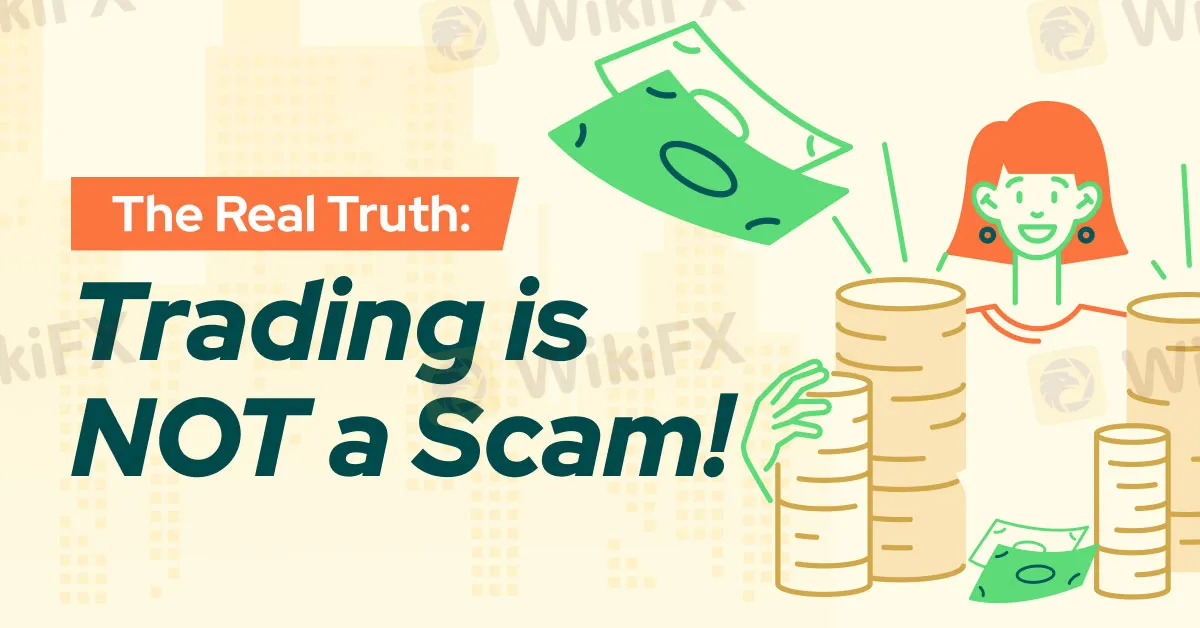简体中文
繁體中文
English
Pусский
日本語
ภาษาไทย
Tiếng Việt
Bahasa Indonesia
Español
हिन्दी
Filippiiniläinen
Français
Deutsch
Português
Türkçe
한국어
العربية
The Real Truth: Trading is NOT a Scam!
Abstract:In the dynamic world of financial markets, where opportunities abound, the notion of trading being a scam often arises, fuelled by misconceptions and unfortunate experiences. However, is this really the truth?

In the dynamic world of financial markets, where opportunities abound, the notion of trading being a scam often arises, fuelled by misconceptions and unfortunate experiences. It is imperative to dispel this myth and recognize that trading itself is not a scam; rather, it is the pitfalls of human behaviour – greed, fear, and lack of education – that can lead individuals astray.
Trading, when approached with diligence and a well-informed mindset, is a legitimate and potentially lucrative endeavour. However, the truth is that many individuals fall victim to scams or experience significant losses due to their own psychological and educational shortcomings.
The first step towards debunking the myth that trading is a scam involves understanding the inherent risks involved. Financial markets are volatile, influenced by a myriad of factors such as economic indicators, geopolitical events, and market sentiment. Lack of knowledge about these factors can lead to poor decision-making and financial losses.
It is crucial for traders to acknowledge that the market's unpredictability is not a scam but rather an inherent characteristic. Professional traders or full-time retail traders invest time in learning about market dynamics, technical and fundamental analysis, and risk management to navigate the uncertainties effectively.
One of the primary culprits behind the misconception that trading is a scam is human greed. The desire for quick and substantial profits can blind individuals to the risks involved, leading them to fall prey to fraudulent schemes or make impulsive, uninformed trades.

Successful traders recognize the importance of discipline and strategic decision-making. They approach trading with realistic expectations, understanding that consistent profitability is a result of a well-thought-out and disciplined trading plan, not a shortcut to overnight wealth.
On the flip side, fear can be equally detrimental to traders. Fear of losses or missing out on potential gains can trigger emotional responses that cloud judgment. Unchecked emotions often result in impulsive decisions, leading to significant financial setbacks.
Education plays a pivotal role in mitigating fear. Traders who invest time in understanding market dynamics, risk management, and developing a robust trading strategy are better equipped to make rational decisions, minimizing the impact of fear on their trading activities.
Perhaps the most significant contributor to the misconception of trading as a scam is the lack of education. Trading is a skill that requires continuous learning and adaptation to changing market conditions. Individuals who jump into trading without a solid understanding of market principles and strategies are setting themselves up for disappointment. Education empowers traders to make informed decisions, assess risk factors, and develop strategies tailored to their financial goals. Recognizing the importance of education is a crucial step in debunking the myth that trading is a scam.
In conclusion, the real truth is that trading is not a scam; rather, it is the human elements of greed, fear, and lack of education that can lead to unfavourable outcomes. Traders must approach the financial markets with a mindset focused on continuous learning, discipline, and strategic decision-making.
Acknowledging the risks, understanding market dynamics, and cultivating a disciplined approach are essential for long-term success in trading. The journey towards profitable trading begins with self-awareness, education, and a commitment to overcoming the psychological pitfalls that often lead to misconceptions about the legitimacy of trading as a financial pursuit.

WikiFX, a renowned platform in the forex industry, offers valuable resources and features to help traders navigate these challenges. By providing comprehensive broker assessments, including transparency ratings, regulatory information, and user reviews, WikiFX empowers traders to make informed decisions and avoid potential scams. Through educational content and market insights, WikiFX equips traders with the knowledge and tools necessary to understand market dynamics, manage risks effectively, and develop robust trading strategies. By leveraging the features offered by WikiFX, traders can approach the financial markets with confidence and overcome the misconceptions surrounding trading as a scam. Download yours now!

Disclaimer:
The views in this article only represent the author's personal views, and do not constitute investment advice on this platform. This platform does not guarantee the accuracy, completeness and timeliness of the information in the article, and will not be liable for any loss caused by the use of or reliance on the information in the article.
Read more

Silver surges past $33—are you ready for what comes next?
Silver has once again become the center of attention in global financial markets.

You need to know this if you are losing money in forex trading!
If you’re losing money in forex trading, you’re far from alone: data from major brokers show that approximately 70 % to 80 % of retail Forex traders end up losing money. This article explores the most common reasons behind trading losses and provides actionable strategies to help you turn your losing streak into a learning opportunity rather than a financial drain.

Japan Issues Urgent Warning on $700M Unauthorized Trades
Japan's FSA warns of $700M in unauthorized trades from phishing attacks on brokerage accounts. Cybersecurity threats continue to rise in the country.

Tradu Joins TradingView for Seamless CFD and Forex Trading
Tradu, a global trading platform, integrates with TradingView for seamless CFD and forex trading, offering transparency, tight spreads, and fast execution.
WikiFX Broker
Latest News
eXch Exchange to Shut Down on May 1 Following Laundering Allegations
How a Viral TikTok Scam Cost a Retiree Over RM300,000
JT Capital Markets Review
FCA Proposes Simplifying Investment Cost Disclosure for Retail Investors
Fresh Look, Same Trust – INGOT Brokers Rebrands its Website
FCA Issues Alerts Against Unauthorised and Clone Firms in the UK
Consob Orders Blackout of 9 Fraudulent Financial Websites
Tradu Joins TradingView for Seamless CFD and Forex Trading
Japan Issues Urgent Warning on $700M Unauthorized Trades
Silver surges past $33—are you ready for what comes next?
Currency Calculator


